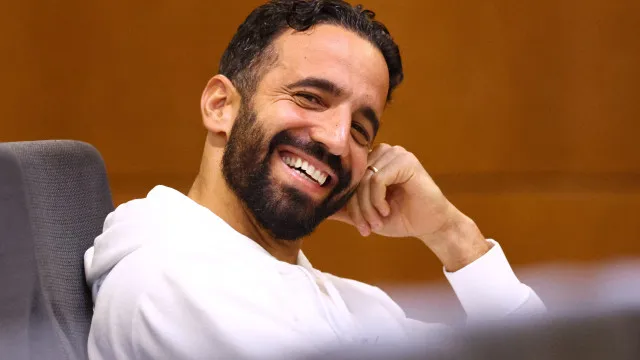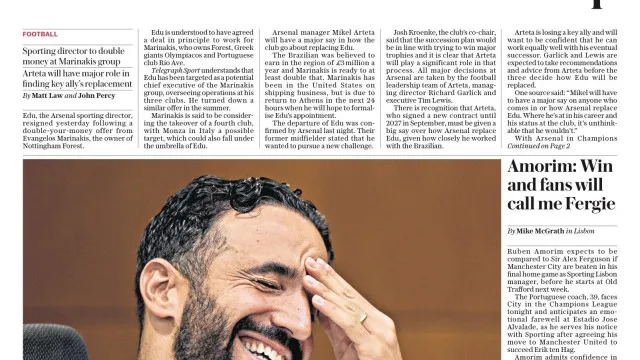










Veja também
Ver de novo
Ghana exhibits artefacts looted during colonialism by UK Dozens of gold and silver artefacts that belonged to Ghana's Ashanti royal court and were looted during the colonial era are going on display this week in a museum in Kumasi for the Ghanaian public.
© Getty Images
1 / 11 Fotos
Ghana exhibits artefacts looted during colonialism by UK Dozens of gold and silver artefacts that belonged to Ghana's Ashanti royal court and were looted during the colonial era are going on display this week in a museum in Kumasi for the Ghanaian public.
© Getty Images
2 / 11 Fotos
Ghana exhibits artefacts looted during colonialism by UK Dozens of gold and silver artefacts that belonged to Ghana's Ashanti royal court and were looted during the colonial era are going on display this week in a museum in Kumasi for the Ghanaian public.
© Getty Images
3 / 11 Fotos
Ghana exhibits artefacts looted during colonialism by UK Dozens of gold and silver artefacts that belonged to Ghana's Ashanti royal court and were looted during the colonial era are going on display this week in a museum in Kumasi for the Ghanaian public.
© Getty Images
4 / 11 Fotos
Ghana exhibits artefacts looted during colonialism by UK Dozens of gold and silver artefacts that belonged to Ghana's Ashanti royal court and were looted during the colonial era are going on display this week in a museum in Kumasi for the Ghanaian public.
© Getty Images
5 / 11 Fotos
Ghana exhibits artefacts looted during colonialism by UK Dozens of gold and silver artefacts that belonged to Ghana's Ashanti royal court and were looted during the colonial era are going on display this week in a museum in Kumasi for the Ghanaian public.
© Getty Images
6 / 11 Fotos
Ghana exhibits artefacts looted during colonialism by UK Dozens of gold and silver artefacts that belonged to Ghana's Ashanti royal court and were looted during the colonial era are going on display this week in a museum in Kumasi for the Ghanaian public.
© Getty Images
7 / 11 Fotos
Ghana exhibits artefacts looted during colonialism by UK Dozens of gold and silver artefacts that belonged to Ghana's Ashanti royal court and were looted during the colonial era are going on display this week in a museum in Kumasi for the Ghanaian public.
© Getty Images
8 / 11 Fotos
Ghana exhibits artefacts looted during colonialism by UK Dozens of gold and silver artefacts that belonged to Ghana's Ashanti royal court and were looted during the colonial era are going on display this week in a museum in Kumasi for the Ghanaian public.
© Getty Images
9 / 11 Fotos
Ghana exhibits artefacts looted during colonialism by UK Dozens of gold and silver artefacts that belonged to Ghana's Ashanti royal court and were looted during the colonial era are going on display this week in a museum in Kumasi for the Ghanaian public.
© Getty Images
10 / 11 Fotos
Ghana exhibits artefacts looted during colonialism by UK Dozens of gold and silver artefacts that belonged to Ghana's Ashanti royal court and were looted during the colonial era are going on display this week in a museum in Kumasi for the Ghanaian public.
© Getty Images
11 / 11 Fotos
Ghana exhibits objects looted during colonialism by the United Kingdom
Dozens of gold and silver artefacts that belonged to Ghana's Ashanti royal court and were looted during the colonial era are going on display to the Ghanaian public in a museum in Kumasi from this week.
© Getty Images
11 Fotos




Descarregue a nossa App gratuita.
Oitavo ano consecutivo Escolha do Consumidor para Imprensa Online e eleito o produto do ano 2024.
* Estudo da e Netsonda, nov. e dez. 2023 produtodoano- pt.com

Descarregue a nossa App gratuita.
Oitavo ano consecutivo Escolha do Consumidor para Imprensa Online e eleito o produto do ano 2024.
* Estudo da e Netsonda, nov. e dez. 2023 produtodoano- pt.com
Recomendados para si
Classificados Auto
Leia Também










Últimas Notícias












Newsletter
Receba os principais destaques todos os dias no seu email.
Mais lidas
- Última hora
- Dia
- Semana
-
1
-
2
lifestyle Dicas e truques de limpeza
Há uma utilização inesperada para as pastilhas da máquina da loiça
-
3
lifestyle Alimentação
Nutricionista ensina a preparar castanhas super fáceis de descascar
-
4
-
5
-
6
-
7
lifestyle Signos
-
8
-
9
pais Proteção Civil
Proteção Civil alerta: Chuvas devem piorar a partir da tarde de hoje
-
10
lifestyle Animais de estimação
Criança morre atacada por rottweiler. O que deve saber sobre a raça


Newsletter
Seja o primeiro a saber
Receba os principais destaques todos os dias no seu email.
© 2024 Notícias ao Minuto. Todos os direitos reservados
- Estatuto editorial
- Propriedade intelectual
- Política de privacidade
- Termos & condições
- Ficha técnica
- Contactos
- Equipa











